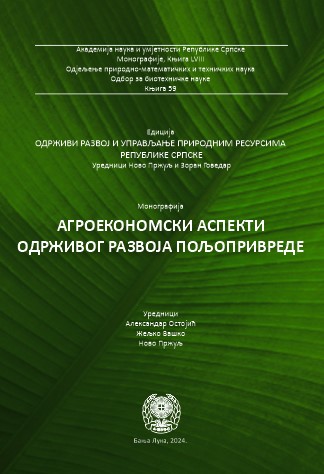Value chains of selected products as elements of sustainability of agricultural production
DOI:
https://doi.org/10.7251/EORU2410131SKeywords:
Product value chains, sustainability of agricultural production, critical points, standards, quality, competitivenessAbstract
The value chain concept is often used in the analysis of agricultural competitiveness. Its application seeks ways and activities that add value to products. The focus is on finding opportunities for efficient monitoring of modern trends, challenges and business risk assessment in order to sustainably produce processing and marketing of agri-food products. The production of fruits and vegetables by small producers is characterized by short chains from production to product placement, without adding value. There are numerous critical points in the analyzed chains, such as quality of input, processing, drying and storage of products, lack of training and financial resources for storage and preservation of products after harvest. The link between primary production and the processing industry should ensure stability for primary producers in terms of the market, and entities in the processing industry for continuity in the supply of raw materials of domestic origin. In order to improve product value chains, and thus the competitiveness of the national agri-food sector, it is necessary to improve productivity in primary production, horizontal and vertical integration, as well as additional investments in processing capacities. The key areas in the legislation and its implementation in order to improve the value chain of livestock products are: animal husbandry, hygiene on farms and in meat processing plants, as well as environmental protection. These are some of the priorities that should create the conditions for the possibility of exporting live animals, meat and meat products to the EU. Improving the milk value chain would contribute to better efficiency, competitiveness and sustainability of production, milk quality, especially in microbiological terms (reduction of the number of bacteria and somatic cells). Conditions should be created for the adoption of good agricultural practice, adaptation to market requirements, reaching standards in the field of animal welfare and health, improving the genetic potential of animals for milk production, hygiene and environmental protection. Quality is an important factor in competitiveness and sustainable agricultural production. As the main elements of the quality management system and adding value to products, the appropriate standards are applied: ISO 9000, HACCP, GMP, ISO 22000, ISO 14000, HALAL standard, Kosher standard, BRC standard, GOST-R standard, Demeter, GLOBAL GAP, IFS standard . In order to overcome and solve environmental problems of agricultural development, more and more importance is attached to the application of animal protection policy measures. Domestic and international standards and regulations for environmental management ISO 14001 are applied, including the EU Environmental Management and Audit Scheme (EMAS). Genetic potentials and biological diversification are important for the development and sustainability of agricultural production. The richness of flora and fauna, genetic resources and great biological diversity constitute natural comparative advantages in every respect, especially for sustainable agricultural production and environmental protection.
